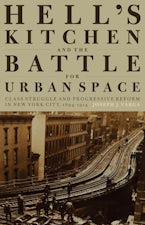Hell’s Kitchen is among Manhattan’s most storied and studied
neighborhoods. A working-class district situated next to the West
Side’s middle- and upper-class residential districts, it has long attracted
the focus of artists and urban planners, writers and reformers.
Now, Joseph Varga takes us on a tour of Hell’s Kitchen
with an eye toward what we usually take for granted: space, and,
particularly, how urban spaces are produced, controlled, and contested
by different class and political forces.
Varga examines events and locations in a crucial period in the
formation of the Hell’s Kitchen neighborhood, the Progressive Era,
and describes how reformers sought to shape the behavior and experiences
of its inhabitants by manipulating the built environment.
But those inhabitants had plans of their own, and thus ensued
a struggle over the very spaces—public and private, commercial
and personal—in which they lived. Varga insightfully considers the
interactions between human actors, the built environment, and
the natural landscape, and suggests how the production of and
struggle over space influence what we think and how we live. In
the process, he raises incisive questions about the meaning of
community, citizenship, and democracy itself.

